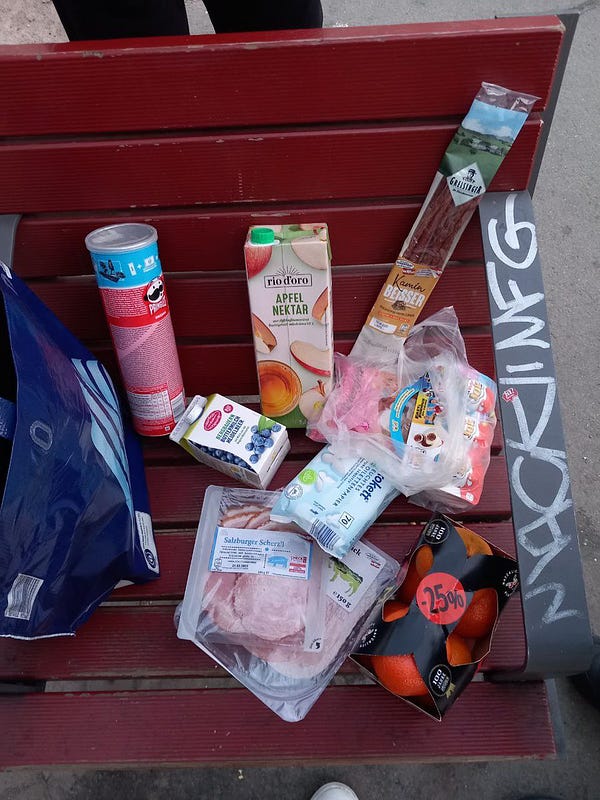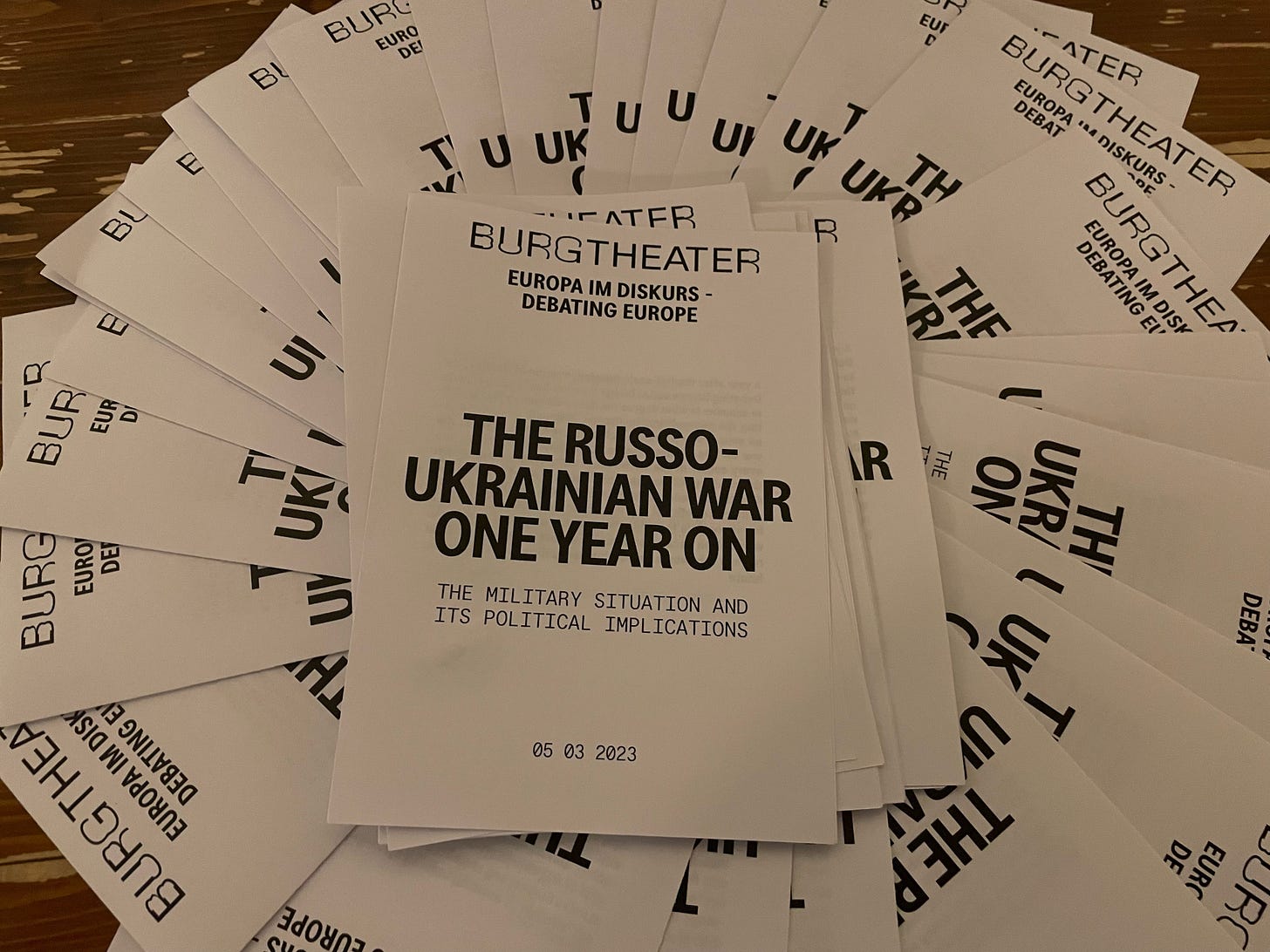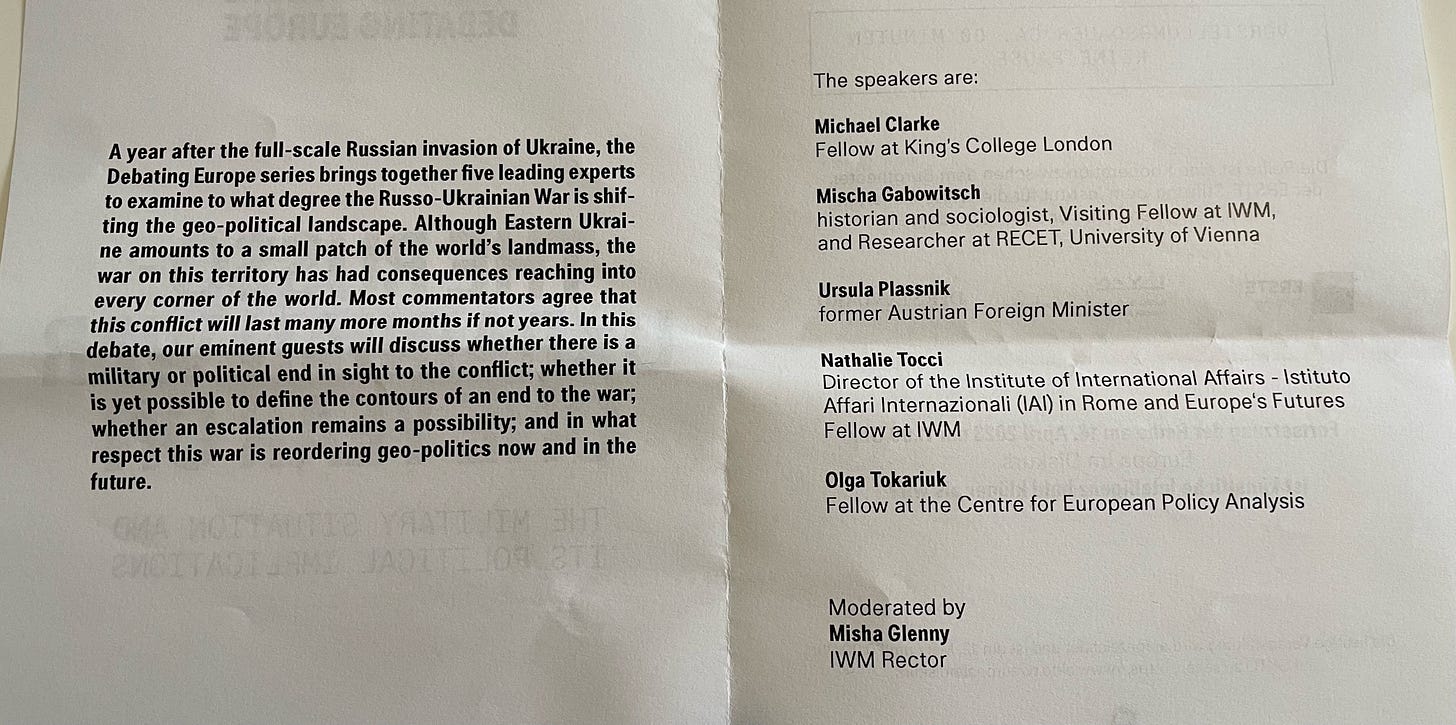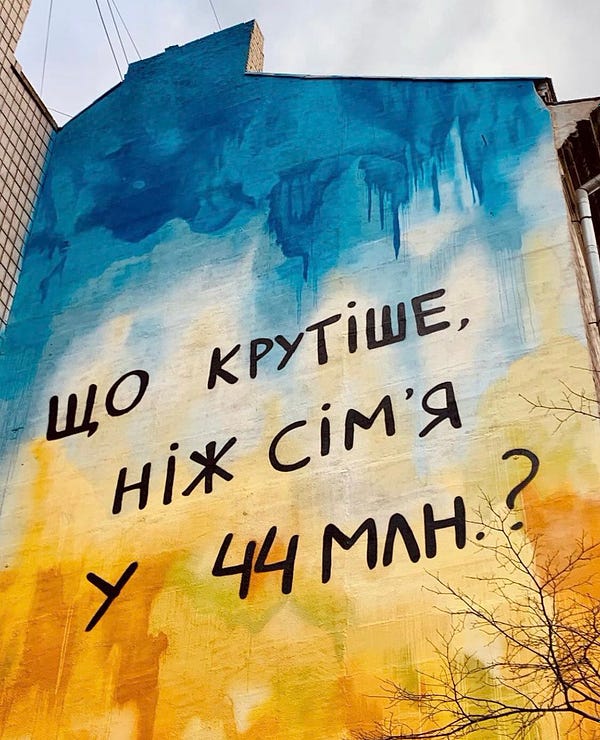"The Russo-Ukrainian War One Year On"
Debating Europe panel discussion in Vienna's Burgtheater yesterday. Summary of a very enlightening discussion amongst top experts in their respective fields.
It was only about ten or fifteen minutes into this truly enlightening discussion that I realised I had better take out my notepad and a pen, despite the dark theater lighting, because what was being said was so important and I knew I would never be able to remember it all by simply sitting there and listening.
I should preface by saying the word refugees did not arise once. This was a geopolitical discussion which tried to put a finger on where things stand now, and where they are headed, and what this means for the world as we know it. Listening to the discussion for me personally felt a bit like I have been swimming underwater for the past year, catching fish one by one, and then I finally put my head up to check what kind of weather was in the air above.
The lovely Olga Tokariuk with impeccable English began the discussion with explaining this war is nothing less than Ukraine’s fight for its right to exist, that Russia would like to wipe it off the map. But that fight cannot be fought alone, and Ukraine is very much dependent on help from the west to keep fighting.
Mischa Gabowitsch then touched on the current climate within Russia: 60% of the population are indifferent to the war, 20% are in favour, 20% against. One of the biggest “accomplishments” of the authoritarian regime in Russia has been de-politicizing the population over the past decades, by design.
Michael Clarke has a way of speaking about military things to make them simple and 100% clear to an audience, like me, who understand very little about military things. Listening to him was fascinating. Unfortunately, he predicts the next four to six months will be the “storm before the calm” in the sense that Ukraine will try to launch a few new offensives (based on what it has capabilities to do) while Russia continues its series of rolling offensives. Michael reflected back on the start of the war, and said in no uncertain terms Russia’s plan was a three-day presidential coup in Kyiv which flopped famously. Regarding the situation now: Ukraine needs at least 100 Leopard 2 tanks; it only has 50. One potential directional push for Ukraine could be towards the south to cut Russia and threaten (if not reach) Crimea.
Nathalie Tocci then spoke about Europe and the EU. The continent has been pushed towards consensus by the war, and as a whole has come together more than it has fallen apart. Climate, energy, China, all big concerns. She discussed a European defense “contradiction” in that the more Europe spends on defense, the more dependent it becomes on the U.S.
Ursula Plassnik shed light on the global moment “stop dreaming let’s get our act together” as she put it. You have the U.S. - China rivalry with the global south pointing increasingly pro-Russia. It is truly a watershed moment now. The U.S. is making a comeback into EU affairs, and the post-war EU security structure as we all knew it has now collapsed. The UN Security Council has been rendered totally dysfunctional, and in the recent UN vote to condemn Russia’s actions in Ukraine, only 141 of 193 countries voted in favour, with 32 abstentions and 7 voting in favour of Russia. The abstentions and pro-Russia votes from the “global south” represent more than 4 billion people in terms of population. Ten countries in the west joined the EU in slapping sanctions on Russia. This "west” is only 14% of the world’s population.
I listened to this all fascinated and also reminding myself that population is one thing, but economic wealth and clout is another. Having said that, there is a tendency in the west to ignore the rest of the world, which Russia and China has both been cultivating for decades. Ursula added the EU is still “asleep” and “shell-shocked” which while harsh is probably a pretty fair assessment. The UN institutions do not function as they cannot be changed (no one willingly gives up power) so the whole post-1945 order from an institutional perspective has stopped working with Russia’s brutal aggression against its neighbour. Which, Michael added, especially since October, became a war against Ukraine’s civilian infrastructure and population.
An imperialist war of aggression of a nuclear power against its neighbour changes everything. It is slightly counter-intuitive therefore that the global south seems broadly ok with Russia’s actions. There is concern re ongoing U.S. support going the 2024 presidential election. There was a discussion of how well Zelensky and team have used social media to counter disinformation and spread Ukraine’s message to the world. Russia was never really held to account after its 2014 invasion. An international tribunal for Russia’s war crimes will be critical. Many western companies continue to do business in Russia…
How secure is Putin vis a vis his own elite? Mischa warns not to put too much emphasis on the words of one “oligarch” in reference to Deripaska’s quote last week in Krasnoyarsk saying Russia was at risk of running out of money in 2024. He also reminded the audience there is no successful track record of palace coups in Russian history. He argued the west will one day need to think of a Marshall Plan for Russia (I sat there thinking no one has the stomach for these thoughts now; the only thing I imagine the world is comfortable with rebuilding right now is Ukraine, and even then it needs guarantees of Ukraine’s security before it invests in reconstruction. ). I also wondered to myself why we are all so hesitant to discuss a post-Putin Russia. Perhaps because it is so hard for most of us to envision. Yet he, like the rest of us, is mortal.
Michael then spoke again about the military situation. Ammunition is a huge issue. The world has now entered a “return to industrial warfare in Europe”. Taiwan is waiting on a $13 billion defense order it placed with the U.S. Ammunition is a factor on both sides: Russia probably has enough left for a few more years, although it has many duds in its warehouses. Ukraine already ran out of Soviet-era shells and is now using NATO/western-sized. The U.S. tripled its order of ammunition this year. Precision weapons like missiles and drones are playing an ever more important role. Ukraine will have to be armed by NATO countries. Russia may turn to China for more ammunition. “China could stop Russia from losing the same way Russia stopped Syria from losing.”
Michael believes Ukraine could win “without NATO troops on the ground”, i.e. without that red line being crossed, but the war is a proxy war for the future security structure in the west. The Kremlin has positioned the war as its fight against a hostile west; NATO sees the war as the fight for the liberal democratic international security order. Retrospectively, Michael says, the west will probably look back and regret not having provided more military aid to Ukraine sooner. In each step of the way, the west waited and then moved its own bar regarding what it was or wasn’t willing to supply Ukraine with.
There was a question about the Balkans and EU ascension and the “parked question” of the past 15 years. It was clear to the panelists that there will be no more “buffer” states in Europe. Nathalie made an interesting point arguing the west is better off with players like Erdogan and Orban on its side rather than outside. This is something I personally would disagree with. I believe someone like Orban makes a lot of problems from the inside, he cannot be trusted, it is like having a spy among your ranks, and I don’t see how keeping him in the EU corner is helping anything. After all, the Kremlin loves to sew division within Europe.
“Neutral” Austria came up next. Ursula joked there wasn’t even a “one week” debate about neutrality. It hasn’t been debated in 25 years, and that is a huge problem. The fundamental basis for our liberal democratic order is the there are public debates on such things as geopolitics, and when something cannot even be discussed anymore, that is a problem. There is no democracy without public debate. Ursula argued neutrality it is only a tool for security, but not an identity in and of itself. She joked that only Sigmund Freud could give a proper answer as to why Austria is not debating its neutrality right now.
I kept thinking how the world is slowly but surely adjusting to the new reality, this new geopolitical situation presented by Russia’s invasion of Ukraine, and how Austria continues to bury its head in the sand, still thinking naively, erroneously, that it can stay out of it. If the whole world is taking sides, you are 800 kilometres from the Ukraine border, and there are values you believe in, how can you stay out of it? Or will certain western countries take Russia’s side, and will Austria be among them? That is really the question at the back of my mind which haunts me and worries me greatly.
In closing, Misha asked the speakers to comment on how they imagine things might look in one year’s time. Michael began by saying he expects militarily Ukraine might be in a better position, and Putin will be looking for ways out. He also reminded us that historically the peaceful period since 1945 was unprecedented, and the world is now a changed place, with two revisionist powers testing the global order of things: Russia using war as a tool and China using systemic competition. The message was you cannot hide from this, you have to rise up and face the challenge.
Nathalie suggested a very interesting and frankly quite plausible scenario for one year from now: Ukraine makes territorial gains and is in a position that it wants to negotiate, and Russia simply refuses to come to the table. What then?
Mischa asked the big question, what happens to Putin? for which there are no clear answers. Ursula said she hopes for peace and an end to the hell which has been put on the people of Ukraine, and hopes EU leadership will speak the truth to people and learn “crisis management”. The west has to act more cohesively than it has in the past. Worries about China, Russia, other countries like Iran, North Korea, Saudi Arabia, BRIC+ thinking they can set the agenda.
Olga was given the last word, and warned us all about a potential widening of the conflict if Russia is not stopped. This made me think about propaganda coming out of Russia this week, “on the street” interviews in which ordinary grandmothers rip apart Poland and the Baltics. These topics don’t make it onto the screens organically. Olga also warned not to discount such rhetoric, reminding us all how many doubted that Russia would actually invade pre-February 24, 2022.
She believes in Ukraine’s victory, and reminded us all how Ukraine has shown to the world this past year that the impossible is sometimes possible.
Later yesterday afternoon, I met a Ukrainian who just came back from Kyiv and brought me some medicine. She refused to take any payment. Her husband is trying to stay in Austria. He has cancer. He has to negotiate with the military commission that they will let him leave for treatment. Back in Kyiv, she said her friends already know the sound of Iranian drone vs. missile. Their “new normal” is air raid sirens, and in general, she said the mood on the ground is not great. That is also my impression. When all these terrible things become “normal”, it is very worrying indeed. Life in Ukraine is also getting more expensive and many do not know how to survive economically. This also matches with what I am seeing and hearing at the arrival center: Ukrainians coming now not because they fled bombs, but because they need work, they need an income, they don’t know how to make it work financially back home anymore.
I also handed out two more cards at the arrival center. One mom from Kyiv oblast had been in Tirol, went back to Ukraine, now came back to Austria. Why? I ask. “The kids wanted to go home.” And now they start all over, and it is not clear where they will be able to access social housing, as they may be forced to go back to Tirol, but there is reportedly nothing left in Innsbruck, only rooms in the countryside. Her sister is in Vienna, but in the hotel where Ukrainians are “fed” on site; also not a great long-term solution. In short, it’s complicated. No easy answers. No quick fix.
The word refugees did not come up once in the panel discussion, so it gave me the opportunity to see things from a totally different, big picture perspective. I was also thinking about all the money western economies have spent dealing with the fallout of Putin’s war, and supporting millions of Ukrainians arriving in Europe. It is not just military aid that costs real money. Humanitarian aid, while of course a fraction of that spent on military aid, is also costing the west. Even “neutral” Austria is spending (some would rightly argue, not enough) on humanitarian aid.
To me this war is not the sound of incoming missiles or air raid sirens (thankfully), but rather than tired, exhausted faces and the countless conversations, the never-ending stream of questions I will carry with me for a long time to come. I sat there on Sunday, in the plush theater with the beautiful red velvet curtains in front of me, listening to the panel of highly intelligent experts, and all I could think about was it is going to get worse again before it gets better. Most Ukrainians are not following such battlefield or geopolitical discussions. But they feel a moment when you cannot stay where you are any longer, and then they make the very difficult decision to leave. And when they leave, they come to us. And we are not really prepared for another wave like last spring. Not at all. And the waves are coming now not so much fleeing bombs as they are hoping for work and economic survival.


Perhaps the next conversation should really focus on how to better support Ukraine’s wartime economy in Ukraine. I keep thinking also about families I know here in Austria who are really not suited to life outside of Ukraine. Life abroad in a new country is not for everyone. If there were safe alternatives within Ukraine, these would be easier and perhaps even cheaper for many. Something else for EU to think about, and frankly UK, U.S., Canada, all the countries who make arriving as a refugee not exactly accessible to all. More help within Ukraine will mean less stress on our systems here. Coming to Europe is not the best solution for everyone for so many reasons. Not everyone can learn a new language and how to operate in a new environment. There are many very vulnerable Ukrainians who are having a really hard time of it, and the resources do not exist here to support them. From an economic perspective, helping those folks to get along within Ukraine, provided they are in “safe” territory, seems like a no brainer, but you need political will to help establish programs. Cash in hand. Job opportunities. The basics remain the same.
Thank you for reading and for your continued support. I am down to my last few cards but it is great to have had a bit of a surplus this week. Hofer is now selling gift cards online which means donating now is as easy as buying a few and sending me the pdfs. Please message me for my email address. I then print them out and hand deliver or send them by post, just as I do with the plastic cards.
p.s. for reading — this one. Take the time for this one. Unlike the recent New York Times podcast which sugar-coated Russia’s genocidal abduction of Ukrainian children, this story tells it like it is, how Ukrainian children in occupied territories were urged to attend “summer camps” and then not returned to their parents, instead indoctrinated with Russian propaganda. No words.









Thanks for this summary. Great to see.